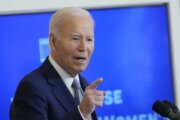When Donald Trump is sworn in as president on Jan. 20, 2025, both the executive and legislative branches of the federal government will be controlled by the Republican Party. The GOP is expected to control the House with a slim 220-215 majority, although that could change if members are tapped for other roles. In the Senate, the party’s majority is 53-47.
With one party controlling the legislative and executive branches, it may be easier to pass legislation, but there are no guarantees. For instance, despite having a House and Senate majority during his first two years in office, Trump was unable to pass the health care reforms he had promised on the campaign trail.
Speaker Mike Johnson has been in discussions with incoming Senate Majority Leader John Thune about what the first 100 days of the next Trump presidency will look like. “(W)e have the menu of options in front of us,” Speaker Johnson said in a statement on his website.
While the details of those options have yet to be publicly shared, here’s what a Republican trifecta could mean for retirees in the years ahead.
Social Security: No Major Reform Likely
Nearly 71 million people received Social Security benefits in 2022, according to the Social Security Administration. But the program may have to reduce payments in 2035 if changes aren’t made. That’s when the Social Security Old-Age and Survivors Insurance and Disability Insurance trust funds will be depleted, based on projections from the 2024 Social Security and Medicare Trustees Report.
However, experts are skeptical that any meaningful reform will come in the near future.
“I do not think it’s possible for much to happen,” says Martha Shedden, president and co-founder of the National Association of Registered Social Security Analysts. “Changes to Social Security must be bipartisan, (and) I am not hopeful for a bipartisan effort in the next four years.”
The last major overhaul of Social Security occurred in 1983. Shedden notes that reform included many different provisions, so there was “something for everyone.”
Rather than comprehensive reform, the upcoming years might bring some smaller changes to Social Security. For one, Trump has proposed eliminating taxes on Social Security payments.
“I think existing retirees would be happy with that,” says Sharona Hoffman, author of “Aging with a Plan: How a Little Thought Today Can Vastly Improve Your Tomorrow” and professor of law and bioethics at the Case Western University School of Law.
According to the SSA, about 40% of beneficiaries see a portion of their benefits taxed. Those revenues are earmarked for the Social Security trust fund.
The loss of those revenues may require other provisions to reduce expenses, such as pushing back the full retirement age. “People are going to have to work for a long time, especially if they stop taxing benefits,” Hoffman says.
[Read: 5 Ways Donald Trump’s Next Presidency Could Impact Retirees]
Health Care: Possible Changes on Three Fronts
A Republican-controlled government could affect access to health care through Medicare, Medicaid and the Affordable Care Act.
Medicare
“There’s a lot of discussion that they are going to try to privatize Medicare further,” Hoffman says. Currently, Medicare beneficiaries can choose to receive their coverage directly from the government or through private health insurers offering Medicare Advantage plans. “A lot of experts say we’ll see almost everyone in these plans,” according to Hoffman.
“The president-elect has … pledged to roll back regulations, and it’s possible that this will provide insurance companies with some room to broaden and experiment with their Medicare Advantage plan offerings,” said Kate Sullivan, vice president of government affairs for the private health insurance marketplace eHealth in Bethesda, Maryland, in an email.
Sullivan also sees the possibility of government action related to prescription drug prices. She notes that President Joe Biden’s administration instituted a $2,000 out-of-pocket cap on drug costs and a cap on insulin prices, with both proposals earning strong bipartisan support.
“It remains to be seen whether President Trump will stick to the Biden-era strategy on drug price negotiations or try something different,” she said.
Medicare also has a trust fund that is facing depletion. Addressing that issue may require substantial reforms, but as with Social Security, it seems unlikely that any significant changes to the program could be enacted right now, says Yuval Bar-Or, professor at the John Hopkins Carey Business School.
Medicaid
Republicans have traditionally opposed expanding Medicaid, and some believe the program could be a prime target for budget cuts.
“For too long, reckless government spending has been the norm in Washington. In particular, spending on Social Security, Medicare, and Medicaid, among other programs, continues to grow at an unsustainable rate,” said Thune in a statement on his website. He notes that “tough decisions” are needed to reduce spending and enact meaningful reforms.
Medicaid provides health care for low-income households, but many retirees also use it to pay for long-term care in their home or a facility. In 2020, nearly a third of Medicaid spending was on long-term care, according to the federal Centers for Medicare & Medicaid Services.
Affordable Care Act
Trump and other Republican leaders have long campaigned on the elimination or replacement of the Affordable Care Act.
Often called Obamacare after President Barack Obama, who ushered the legislation into law, this act provided sweeping health care reforms. They included eliminating coverage denials because of preexisting conditions, requiring that certain preventive services be covered at no cost and establishing subsidies to cover the premiums of eligible households that purchase their own health insurance.
Many early retirees use private insurance — and premium subsidies — until they become eligible for Medicare at age 65. Any significant change to the Affordable Care Act could affect them.
At an October campaign stop, Speaker of the House Mike Johnson appeared to take aim at the Affordable Care Act. “We need massive reform,” he said, but no details have been revealed yet.
Cost of Living: Tariffs and Deportations Could Drive Inflation
For retirees, a Republican-controlled government could mean higher prices, according to observers.
“There is a lot of concern that tariffs and deportation of low-wage workers will affect inflation,” Hoffman says.
Trump has said one of his priorities from Day One will be mass deportations of those in the country illegally. As of 2022, there were approximately 11 million unauthorized immigrants in the U.S., according to the Pew Research Center.
“It’s going to cost massive amounts of money to remove that number of people from the country,” Bar-Or says. Expelling people from the workforce could drive up wages and increase prices. “Retirees tend to be the most (hard hit) segment of society when inflation goes up,” Bar-Or says.
Tariffs have also figured prominently in Trump’s plans for his second term. He has recently called for 25% tariffs on products coming from Mexico and Canada and, in the past, suggested a 60% tariff on items coming from China and a 20% tariff for goods from other countries.
“Tariffs might sound like a good idea to level the playing field,” Bar-Or says. “But tariffs will raise prices, and they will act as a tax on American consumers.”
Tariffs could also have the effect of stifling innovation by U.S. companies, according to Bar-Or. Currently, American businesses need to find ways to remain competitive with global companies, but a tariff would create a floor for their prices. Without the same level of competition, there may be little incentive to keep prices low and improve efficiency, he says.
[READ: How to Build a Balanced Retirement Portfolio]
Investment Activity: Deregulation Could be Boon to Market
All is not bleak for retirees. The GOP has traditionally favored fewer regulations on corporations and industry, and deregulation may be expected now that the party controls both the legislative and executive branches.
Johnson has said as much on the campaign trail, telling a crowd in Pennsylvania: “We want to take a blowtorch to the regulatory state.”
“That might unlock merger and acquisitions activity,” Bar-Or says. “For instance, it may create more of a kick to a bull market.” Fewer regulations may reduce business costs, and Bar-Or says small company stocks might outperform in the coming years.
That could help boost the nest eggs of retirees and workers invested in the stock market.
For at least the next two years, the Republican Party will control the executive and legislative branches of government. Given the relatively slim majority in the House, it remains to be seen what legislation can be passed. However, workers should be prepared to see proposals introduced that could impact their retirement.
More from U.S. News
How to Undo Claiming Social Security Early
What You Need to Know About Running a Business in Retirement
Best Investing Apps for Retirement
What Does a Republican-Controlled Government Mean for Retirement? originally appeared on usnews.com







